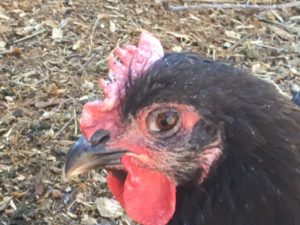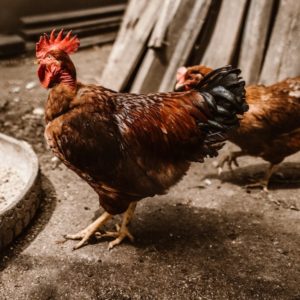My Chickens Have the Pox!
by Anne-Marie Miller
The most vulnerable time for my chickens is at the end of the sizzling Summer months. I know, if illness is going to strike, it will be during this time. I am learning from experience that the Mediterranean breeds of chicken do better in my hot humid climate. These birds have a tight feather arrangement. No fluff involved on these girls. The most common types in this class are Leghorns and Spanish. My daughter and her bestie talked me into a sweet little blue cochin chick this Spring. They named her Raincloud. She is our favorite bird, but my, she is just one little ball of fluff. I felt bad as the Summer heat stretched on. She was one hot, mouth breathing mess! She made it through, so it should be smooth sailing till next Summer.
 Our end of the Summer malady this year was: “The Pox!” It’s odd, when your kids get itchy sores all over their bodies we call it chicken pox. When your chickens get itchy sores on their combs and legs, they still call it chicken pox! Well, Fowl Pox to be exact. My poor egg laying divas are a bit miserable this week since they contracted this virus. Can’t forget the man of the chicken yard. We have a rooster this year! Yes, I live in the middle of a busy city. If you missed our review of the “No Crow Chicken Collar” see it HERE. Not to worry, even though this disease has the same name as the one kids get, it cannot be passed from chicken to kid!
Our end of the Summer malady this year was: “The Pox!” It’s odd, when your kids get itchy sores all over their bodies we call it chicken pox. When your chickens get itchy sores on their combs and legs, they still call it chicken pox! Well, Fowl Pox to be exact. My poor egg laying divas are a bit miserable this week since they contracted this virus. Can’t forget the man of the chicken yard. We have a rooster this year! Yes, I live in the middle of a busy city. If you missed our review of the “No Crow Chicken Collar” see it HERE. Not to worry, even though this disease has the same name as the one kids get, it cannot be passed from chicken to kid!
I should warn here that there are two types of this disease; Dry Pox and its more serious cousin Wet Pox. Wet Pox is when the sores enter the mouth and throat of the chicken and can cause secondary respiratory infections. It is, this second more serious form of the virus, that would necessitate veterinary help and medication.While you can get vaccines to prevent both forms of the virus it doesn’t really make monetary since for the backyard chicken owner to vaccinate their little flock.
Thankfully, my chickens just have dry pox. Fowl Pox is just a pesky virus so all you can do is really support your chicken’s immune systems and wait it out. You might be asking; how do you support your chicken’s immune system?
How to Support a Chicken’s Immune System
1. Increase their protein through nutritious insects. I have been raising meal worms and black soldier flies for my chickens for years. A side benefit of tempting them with meal worms is that you can get close to them when you need to examine or treat them. If you are interested in learning how to raise insects for your girls, HERE are a few links to show you how.
2. Give them fermented grains. If you are not fermenting your chicken feed, you should be. It is very easy and allows your chickens to get better nutrition from the food you give them. It also saves you $. HERE is a link to an article about fermenting your chicken feed.https
3. Give them kefir for probiotics. I know what you’re thinking; Yogurt for your chickens? Well, kefir is not exactly yogurt. Most of the lactose part of it has been removed by the beneficial bacteria. If you make kefir like I do, you know that YOU HAVE GOBS AND GOBS OF THE STUFF! If your chickens want it, then you are sooo happy to have something to do with it! If you are buying it from the grocery store for your chickens, then you need your best friend to give you some kefir grains and demonstrate how easy it is to make the stuff! If you don’t have weird friends that grow weird stuff on their countertops, then you can pick up starter grains at a health food store. The point is it is super good for your chickens.
4. Apple Cider Vinegar in your layer’s water. Although there are not any scientific studies on the effects of ACV on chicken health many people have noticed significant health improvements in their birds after adding it to the water troughs. I started giving it to my girl’s after I had an outbreak of coccidiosis in my flock. I am happy to report that it has been 2 years and I have not had a reoccurrence of that awful parasite in that time. Also, a side benefit I have noticed is that the eggs we are getting now have harder shells. The dose I use is 1 TBSP of ACV per gallon of water one week out of every month.
5. Give your chickens Kombucha vinegar and chopped up SCOBY. For those of you that are unfamiliar with the wonderful world of Kombucha. It is a fermented tea drink full of amazing probiotics and vitamins for our healthy bodies! A SCOBY stands for: Symbiotic Cultured Organism of Bacteria and Yeast. It is the “mother” that is responsible for all the wonderful healthy goodness in the tea and your chickens will LOVE IT! Kind of like the kefir, this SCOBY is constantly doubling in size, so you will have an abundant supply to give to friends or your chickens. When I first served it up to my girls as a solid piece they weren’t too crazy about it, but it was when I chopped it in my food processer and put it in their dish that all mayhem broke loose.
If you leave your Kombucha to ferment for about 4 weeks or longer the beneficial bacteria will eat up all the sugar and you will be left with a vinegar. I serve this up to my chickens at the same rate as ACV-1 TBSP/one gallon of water for 1 week out of every month. So, my watering schedule is one week with ACV vinegar and then one week with clean fresh water. After that one week with KBV vinegar followed by fresh water.
6. Mix up a sunflower seed, pumpkin seed, DTE, wheat germ oil mixture. Black sunflower seeds have good fats for your chickens and pumpkin seed is a natural parasite deterrent. Best to serve this just as the cool weather of Winter is blowing in. Too many calories during the hot months can be hard on chickens.
 Here is my seed mix recipe:2 cups black sunflower seeds2 cups dried pumpkin seeds2 TBSP diatomaceous earth (food grade)4 TBSP wheat germ oilI give my rabbits 1TBSP each day and about 1 cup per day for my flock of 15 chickens for 1 week. I then skip a week and give it again due to the common parasite cycle. No need to buy pumpkin seeds. In the Fall, the day after Halloween to be exact, my neighbors put their festive Fall décor of big orange pumpkins out by the curb for the trash men or me to pick up. The more upscale the neighborhood the more pumpkins for the taking. So, if you are like me you might have to cross to the other side of the tracks to collect your pumpkins😉 If you’re lucky you might find a couple of hay bales too.
Here is my seed mix recipe:2 cups black sunflower seeds2 cups dried pumpkin seeds2 TBSP diatomaceous earth (food grade)4 TBSP wheat germ oilI give my rabbits 1TBSP each day and about 1 cup per day for my flock of 15 chickens for 1 week. I then skip a week and give it again due to the common parasite cycle. No need to buy pumpkin seeds. In the Fall, the day after Halloween to be exact, my neighbors put their festive Fall décor of big orange pumpkins out by the curb for the trash men or me to pick up. The more upscale the neighborhood the more pumpkins for the taking. So, if you are like me you might have to cross to the other side of the tracks to collect your pumpkins😉 If you’re lucky you might find a couple of hay bales too.
I have a friend that works during the day, so she decided to take a different route to gather her pumpkins. She put it out there on social media that she wanted pumpkins and asked if people could bring them by. Before she knew it, she had pumpkins shoved in every nook and cranny of her home. It was hilarious to hear her describe her overabundance of pumpkins! She made pumpkin pie, pumpkin muffins, pumpkin soup ect. I am not sure her family will ever feel the same about pumpkin again. Her story reminded me of an I Love Lucy episode!
Scrape out the seeds, separate them from the stringy stuff (don’t rinse them) spread them out to dry in your oven at a low temperature. Then use them in your seed mix. I picked up the rest of the ingredients for my mix at the local feed store.
The only real treatment I applied to my chicken’s combs was a mixture of coconut oil and lavender essential oil; at 1 drop to ¼ cup of coconut oil. It seemed to work beautifully with no ill effects to my flock. I think it probably helped speed up recovery time? Here is my disclaimer about this treatment: I am not a vet and essential oils are VERY strong especially when used on poultry. Please use common sense and consult a vet if you feel unsure about any treatment plan.
I have given you lots the budget friendly ideas to build your chickens up after the hot Summer months or whenever they are coming out of a stressful time. It occurs to me that the vulnerable time for some backyard flocks might be just coming out of the snowy Winter months. If you have any tricks for supporting the health/preventing disease in your backyard flock, please share them with us in the comments. My online urban farming community is my first line of defense when I have a problem. Thank you to Greg, the urban farming team and you for lifting me up when I fall down!
 Anne-Marie or Dash (for the hyphen in her name) is an urban farmer in Dallas, Texas. She raises chickens and rabbits on less than ¼ of an acre. Plus, she has turned her front yard into a large stand-out-in-the neighborhood vegetable garden. In addition to the farming she does on her homestead, she helped create a community garden literally from grassy field to thriving garden. What stands out about her little urban homestead is her determined out of the box approach to overcoming obstacles. You can follow her adventures on her little urban homestead by visiting her blog, BloomWhereYourPlanted.com.
Anne-Marie or Dash (for the hyphen in her name) is an urban farmer in Dallas, Texas. She raises chickens and rabbits on less than ¼ of an acre. Plus, she has turned her front yard into a large stand-out-in-the neighborhood vegetable garden. In addition to the farming she does on her homestead, she helped create a community garden literally from grassy field to thriving garden. What stands out about her little urban homestead is her determined out of the box approach to overcoming obstacles. You can follow her adventures on her little urban homestead by visiting her blog, BloomWhereYourPlanted.com.
SaveSave






